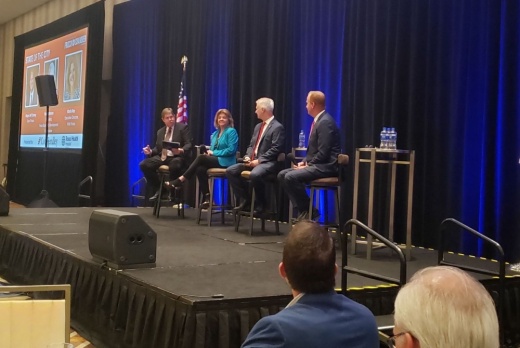Patterson made the announcement during the Frisco Chamber of Commerce’s annual State of the City luncheon and panel discussion June 15. Patterson had previously served as the city’s assistant city manager before coming to the EDC in 2018, so the transition back marks a homecoming for him.
“The last 3 1/2 years of working with this EDC team have been incredible,” Patterson said during his announcement. “You are awesome. I love you, and you are going to continue to thrive. ... I’m looking forward to the fact that I still get to work with you, but in a different capacity.”
Current EDC Vice President Jason Ford will step in as the new president of the EDC once Patterson transitions to the deputy city manager role. Ford has been on the EDC staff for the last two years.
“Frisco is so strong economically because of the great leadership and the diverse creative strategy that's been put together,” Ford said. “I am blessed to be a part of a team that values long-term sustainability, excellent leadership and execution, and to really be surrounded by a great team of people.”
‘We’re back, baby’
In addition to Patterson’s announcement, Frisco officials were asked during the State of the City about other ongoing initiatives and projects in Frisco and where the city stands in the year following the coronavirus pandemic.
Mayor Jeff Cheney said that a few months ago during a Frisco City Council executive session, Patterson was giving Council an update on all the business activity happening in Frisco, and that it was "exciting and invigorating."
“I walked out of executive session, turned to Ron and just said, ‘We’re back, baby,’” Cheney said.
The forum was moderated by Tony Felker, the president and CEO of the Frisco Chamber of Commerce. With more businesses returning to normal operations, Frisco’s economy is “once again thriving,” Felker said.
“The focus now is to continue growing the business community and bringing visitors back to our region,” Felker said in a statement. “Heading into the pandemic, Frisco was named the ‘Most Resilient Resistant City in the U.S.,’ and we lived up to the billing.”
Patterson pointed to the “resiliency” of Frisco as well. Businesses are interested more than ever in coming to Frisco, in spite of the economic fallout from the pandemic, he said.
“We do have companies realizing, ‘Hey, things are different in Texas, but also different in Frisco,'” Patterson said. “When we talked to companies, we heard a number of comments about, ‘How did y’all do that?’ ‘We were impressed by... ,’ ‘The customer service is just incredible.’ So the answer is yes, they're noticing, and they comment it back to us.”
The resurgence of Frisco’s economy is being felt not only by the business sector, but also by the tourism industry. Marla Roe, executive director of Visit Frisco, said people are once again booking Frisco’s hotels and are wanting to come to the city.
“Something happened in March; I don’t know what, but it was like the gates opened up,” Roe said. “We booked more business in April and May this year than 2019, which I think is a huge milestone.”
One of Frisco’s goals is to increase its taxable value, Cheney said. Currently the city has about $30 million in taxable value, with about 70% of that being residential tax value and 30% commercial. The city’s long-term goal is to get that to be about 50%-50%, he said. The city will work on building out projects over the next 10-15 years to help reach that 50% commercial value, Cheney said.
The projects included the new Professional Golfers Association of America headquarters, the Omni PGA Frisco Resort, new mixed-use developments with The Link and Fields, the University of North Texas at Frisco campus coming in fall 2022, a performing arts center, Grand Park, the Frisco library relocation and the Rail District’s revitalization.
“The best is yet to come,” Cheney said.
Editor's note: The original post has been edited to correct an error. Ron Patterson is set to be Frisco's deputy city manager.





